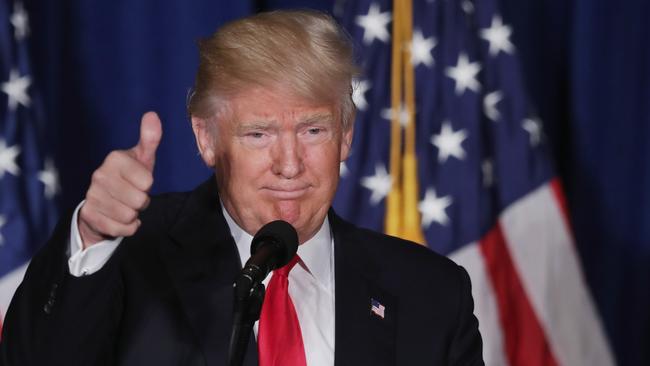What really happened at the Mayflower Hotel?
WHAT really happened with the Russians at the Mayflower Hotel? An explosive theory about Donald Trump has emerged in the last week.

A THEORY about Donald Trump emerged on Twitter last week that could have huge ramifications.
You might not have heard of the Mayflower Hotel scandal, but it goes to the heart of Trump’s unseemly relationship with Russia.
The weird thing about the scandal is that all the major facts have already been reported by established journalists in respected media outlets, yet none of them have laid out a narrative that explains how the facts fit together. Until now.
During the week, lawyer and journalist Seth Abramson released a so-called ‘megathread’ on Twitter, which pieced together an incredible tale, pointing to a cocktail party at the Mayflower Hotel last year as the place where the agreement for Russia to assist Trump in the elections all began.
(MEGA-THREAD) The plot to sell America's foreign policy for foreign oil _and_ steal an election in the bargain began at the Mayflower Hotel. pic.twitter.com/XkoFpmMAeJ
— Seth Abramson (@SethAbramson) March 24, 2017
On 27th April last year — the night that he made his first major foreign policy speech at the Mayflower Hotel — Donald Trump held a secret cocktail party at that very same hotel where he met with the ambassadors of Russia, Italy and Singapore.
Why are Russia, Italy and Singapore significant?
Well, remember the dossier of dirt on Trump that Buzzfeed released at the end of last year? It was written in the months after that April 27th meeting, and it alleged there was a deal that Trump would drop the sanctions against Russia and let them sell 19 percent of oil company Rosneft, and that Trump would benefit from this transaction.
The thing is that in early December, shortly after Trump had won the election, 19.5 percent of Rosneft was sold to unknown buyers, in a complicated three-nation deal. Who were the countries party to the deal? Russia, Italy and Singapore.
While the details of the deal are secret, the dossier implied that if Trump was elected, and let the deal slide through, he would receive a “brokerage fee” for helping make it happen. If that fee was the extra 0.5 percent on the transaction, that means that Trump may have pocketed $200-$250 million out of the transaction.
Thus, the allegation at the centre of the Mayflower Hotel Scandal is that on that night a deal was struck: The Russians would assist Trump in getting elected, and in return, Trump would drop sanctions against Russia, allowing the Rosneft deal to go through, and to sweeten the deal, Trump would receive 0.5 percent “brokerage fee”.
All of the information that Abramson has used to compile this narrative has been reported in traditional media outlets with household names: The Wall Street Journal, The Guardian, The New York Times, The Washington Post. But none of them have quite pulled the threads together. Instead, this has been left to “citizen journalists” on Twitter.
I interviewed Abramson during the week. He calls what he’s doing “Curatorial Journalism”.
He says that traditional media has been so behind the game on some of these bigger stories because traditional media companies have over-invested in punditry, and under-invested in proper investigative journalism, that can pull the strings together.
But Abramson is not surprised. He says the modern commercial newsroom is not cut out to deal with the sheer volume of information available. “Today there’s simply too much information being produced for it to be coherently consumed by any one person. So a curator is needed to assist investigative reporters in being heard.”
“I’m sifting through a large amount of data and exposing and narrating novel relations between existing content.”
He says that it’s fascinating to piece together a story, and that sometimes outsiders, who aren’t on the “Washington dinner-party” circuit are in a better position to do it. “Seeing how a news story barely noticed at the time it was published sheds light on another story published in a different venue and possibly even a different nation.”
If you haven’t read Abramson’s Megathread, it’s worth a look. The whole thing is quite incredible, and one of the more compelling aspects of it is how it stands on the shoulders of conventional reporting, pulling together the various threads.
Even though there is clearly more to unfold in the story, there are some amazing details that suggest there is at least a cover-up going on over the Mayflower Hotel meeting.
For example, Trump’s Attorney-General Jeff Sessions was at the party that night. He has admitted to meeting the Russian Ambassador twice during the election campaign, but still has not acknowledged meeting him a third time at the Mayflower Hotel, suggesting that the Mayflower Hotel meeting is particularly sensitive.
And guess who else was there that night? Devin Nunes, the increasingly discredited Republican Congressman, who is currently supposed to be running the House Investigation into the Trump campaign’s ties with Russia.
As for Abramson, he says that as a Jew and a lawyer, he is particularly invested in this story, and that’s what gives his journalism an edge. “The best citizen journalists are those committed to the topics they’re investigating: it makes you work harder, sweat the details more, and be conscientious about how your research is presented.”
And although he’s grateful that Twitter has enabled this new, important form of journalism, he also acknowledges that it’s also a very clunky way to do it. “I’m thankful to Twitter for giving me an opportunity to share my writing, but in so many respects it’s a terrible medium.”
Charles Firth majored in Economics (Social Science) at Sydney University. He is also editor of The Chaser Quarterly. Follow him on Twitter @charlesfirth



